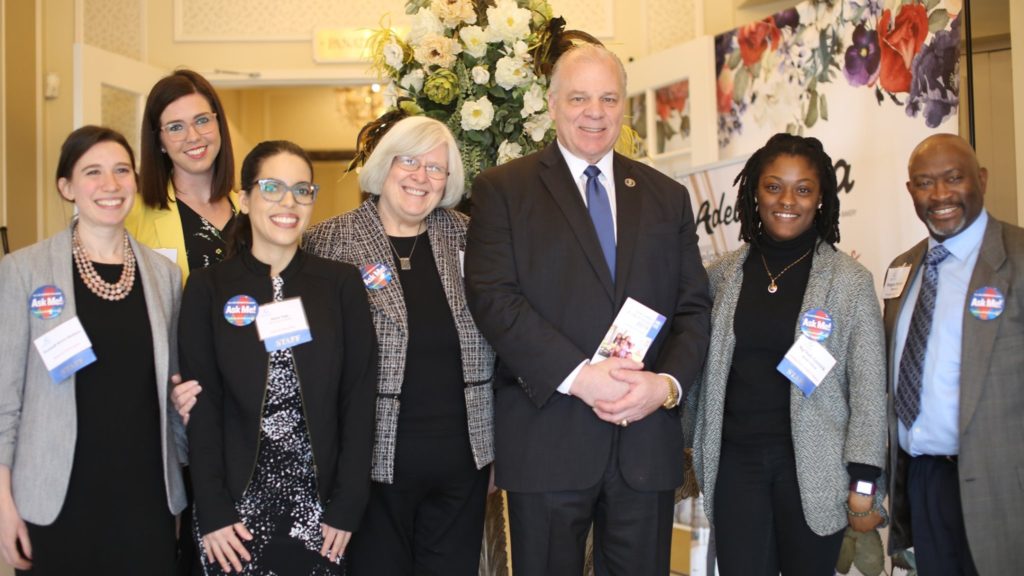Posted on February 6, 2020
On February 3rd, Vega and ACNJ Vice President Mary Coogan spoke to the Committee about everything that the New Jersey Census Coalition is doing to ensure a complete count for the Census, from handing out materials to educating others on the Census in general.
In response, Assemblywoman Gabriela Mosquera (D-Camden, Gloucester) is sponsoring two resolutions that would increase Census participation, citing ACNJ’s testimony. Read the press release.
Read the testimony below:
To: Assemblywoman Gabriela M. Mosquera, Chair
Assemblywoman Lisa Swain, Vice Chair
Members of the Assembly Women and Children Committee
From: Mary Coogan and Alana Vega, Advocates for Children of New Jersey
Date: February 3, 2020
Re: Census 2020
Thank
you for your interest in the 2020 Census. Advocates for Children of New Jersey
(ACNJ) appreciates the opportunity to share some information about the upcoming
Census and as well as information about activities throughout the state and
ways you all may be able to help ensure that New Jersey has a complete count
this year.
Assemblywoman
Mosquera, as a member of New Jersey’s Complete Count Commission you already
know how important a complete count is to New Jersey. Thank you for your
support of this effort and the statewide outreach that is ongoing.
As
you all know, the U.S. Census is a national survey conducted every ten years by
the U.S. Census Bureau to count EVERY living person in the United States. People
of all ages, races, and ethnic groups as well as citizens and non-citizens must
be counted. The Census is so much more than just a head count. Its results will
impact New Jersey for the next ten years.
The
census count helps determine New Jersey’s number of seats in the house
of representatives, its number of votes in the electoral college, and
our voting district boundaries.
The
census count helps to determine the distribution of more than $22.7 billion
in federal funds to New Jersey each year to support important programs and
services like Medicare, Medicaid, Head Start, schools, hospitals, roads, and
more. In your folders is a handout from Counting for Dollars, a project that
highlights different programs whose allocations are impacted by Census data. These
programs touch all New Jersey residents in some way. We are all affected if we
do not have a complete count.
Census
data are used for important planning purposes so that we know where to build
more roads and schools when populations are growing. We at ACNJ uses census
data to produce our Kids Count reports so an accurate census is very important
to us!
This
morning we want to highlight some information that we think everyone should
know about the census. To that end we have put together a folder with some of
our printed handouts and some slides from our community presentations.
Beginning
March 12, 2020, New Jersey residents will receive an invitation to complete
their census forms either online, on the telephone or by mail. Completing the
census questionnaire through the U.S. Census Bureau website or on the telephone
is new this year.
As the Census Bureau likes to say, the Census is easy,
safe and important! The questions asked cover the basics: name, age, date of
birth, gender, race or ethnic background, relationship to the person completing
the form, head of household, and whether the residents own or rent. These
should be completed for each person residing at that address.
In
addition to English, people can respond to the Census online or by phone in 12
different languages:
- Spanish
- Chinese
- Vietnamese
- Korean
- Russian
- Arabic
- Tagalog
- Polish
- French
- Haitian Creole
- Portuguese
- Japanese
The
paper form will be available in English and Spanish.
The Census
Bureau will NEVER ask for one’s social security number, money, donations,
or bank and credit card information.
ACNJ
became involved in outreach about the census through a grant from the Annie
Casey Foundation to focus on the hard-to-count population of children under the
age of 5. It is estimated that the number of children in this age group missed
in the 2010 census was about 2 million nationally and 27,000 in New Jersey.
There are other hard-to-count populations such as non-English speaking
residents, highly mobile individuals, renters, and people of color. These groups
will require more outreach as they are most at risk of being missed in the
upcoming count.
The
reasons some folks are missed in the Census count can be complicated, but some
of the most common reasons include: language barriers and fear or mistrust of
the government. Other reasons may include an unlisted address in a multi-unit
building or unregistered apartment such as in a basement or attic.
In
the case of young children, most were missed because they were left off the
form. ACNJ began our work by contacting those who interact with families of
young children: child care providers. We have provided information and training
to child care and head start staff throughout the state who can now share
information with parents and caretakers.
This
work is privately funded through New Jersey foundations that fund ACNJ’s early
learning work: Henry & Marilyn Taub Foundation, Maher Charitable
Foundation, The Burke Foundation,
The
Schumann Fund for New Jersey and Turrell Fund.
The
statewide outreach being done by a coalition of nonprofits was spearheaded by
Kiki Jamieson, President of The Fund for New Jersey. Kiki Jamieson has also
raised private funding from the New Jersey philanthropic community and they
should be applauded and recognized for their efforts and support. The Victoria
Foundation and the Russell Berrie Foundation are
also supporting ACNJ’s statewide outreach.
The
Census 2020 NJ Coalition includes the following organizations: The New Jersey
Institute for Social Justice, Latino Action Network Foundation, Wind of the
Spirit, Asian American Federation, Make the Road New Jersey, League of Women
Voters New Jersey, The National Association of Latino Elected and Appointed
Officials (NALEO), New Jersey Citizen Action, Action Together New Jersey and
the Housing and Community Development Network of New Jersey. We divided up
cities with significant hard-to-count populations, so that we could spread out
and efficiently use our limited resources. At the same time, we worked with the
staff of the New Jersey Complete Count Commission to connect with communities
and counties interested in organizing a complete count committee to coordinate
a plan of action.
Coalition
members are in touch on a regular basis so that we don’t duplicate efforts. For
the most part, communities have been responsive and interested in helping with
the outreach. ACNJ is providing technical assistance, training and printing
materials, both our own and the great materials developed by the Census Bureau.
This is important as counties and organizations are implementing their plans
with state grants and do not necessarily have the time to create materials.
In
your folders are some of our fact sheets and those of one of our partners, the
New Jersey Institute for Social Justice. They also have materials in several
languages.
So
what can you all do to help? The resolutions being considered today are a great
way to bring attention to the upcoming census and to help encourage a full
count. There are lots of no cost and low-cost things that we can all do and we
are here to ask your assistance in this outreach.
First
share the information that we just shared with you, with your colleagues,
community, family and friends and ask them to share it as well. You can put
information on your website or share through your social media. Perhaps you
have a listserv or a newsletter through which you can share information with
your constituents. There are complete count committees that will be scheduling
events and coordinating locations where NJ residents can go to complete their
census questionnaire. You can promote these events and locations. Perhaps
attend an event which will bring more publicity to the effort and increase the
turnout.
Perhaps
you have contacts with media through which you can share census information or
urge residents in your community to complete their census. While the federal
Census Bureau and the State of New Jersey will make media buys, we all know
that there are non-traditional media outlets that we all rely on for
information.
Now
that you are all experts, please wear your “Ask me about the Census” button and
help us spread the word!
Thank
you!



